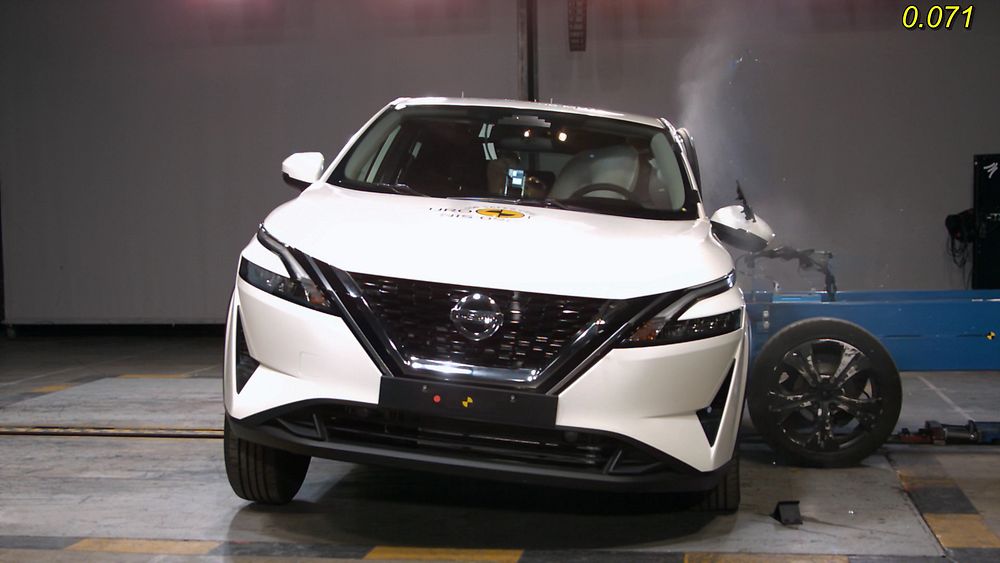Press release -
HERO TO ZERO: Zero-star safety rating marks fall from grace for first five-star carmaker
- The Renault Zoe receives a Euro NCAP zero-star rating, having removed vital airbag which protects against head injuries in side impacts.
- Dacia Spring performs poorly in active and passive safety across all assessment categories, resulting in a one-star Euro NCAP rating for the new vehicle.
- BMW iX, Genesis G70 and GV70, Mercedes-Benz EQS, Nissan Qashqai, Skoda Fabia, and VW Caddy all achieve five-stars with good active and passive safety performance.
The final round of Euro NCAP testing of 2021 reveals some sobering safety scores for two new vehicles from the carmaker who brought five-star safety to the market 20 years ago. The Renault Zoe and Dacia Spring have achieved zero-stars and one-star respectively in safety assessments.
The Renault Zoe, a vehicle in the Supermini class, becomes only the third car in Euro NCAP’s history to achieve a zero-star rating.
In 2021 it is assumed that vehicles coming to market will keep occupants safe in the event of a crash. However, testing of the Renault Zoe has revealed some eye-opening results from the crash test dummies used to simulate real-life impact scenarios.
Poles apart
In the frontal offset crash the results were rated as ‘poor’, due to weak protection for the chest area of the driver side dummy specifically. But it was Euro NCAP’s severe side pole test that revealed the most drastic results, with the driver’s head directly impacting the intruding pole.

The test replicates real-world impacts involving a vehicle travelling sideways into rigid roadside objects such as trees or poles. 33%[1] of these impact types are classified as fatal or serious accidents.
As the forces on the car are so localised, the pole can penetrate deeply into the passenger compartment – and without effective protection – can strike the head resulting in serious injuries.
As such, the red body parts seen on the dummy shows a potential threat of serious injury and threat to life in the event of an accident.
Matthew Avery, Thatcham Research’s Chief Research Strategy Officer and Euro NCAP board member comments: “It is a serious concern to see results like this in 2021, especially from a carmaker who has previously performed well in Euro NCAP testing.
"Renault was the first to achieve the full five-star rating in 2001, in part because it was also the first to include a combined head and thorax airbag in the Laguna 2. Although this was a new and revolutionary safety measure at the time, today this airbag is available on most modern cars. Unfortunately, a conscious decision has been made to remove the head protection from this vital passive safety feature, by the brand that pioneered the use of it. As a result, the safety of occupants within the vehicle has been compromised.”
The Renault Zoe was originally tested by Euro NCAP in 2013, where it achieved a five-star rating. However, key passive safety features have since been removed from the vehicle and with Euro NCAP raising the bar in its testing every two years, the Zoe has been left far behind the standard achieved by most carmakers in 2021.
It also lacks active safety technology such as Lane Departure Warnings, vehicles with this technology fitted have a lower involvement rate in fatal crashes [2], and Autonomous Emergency Braking, one of the most important recent developments in car safety which has been shown to reduce front-to-rear crashes with injuries by 56% [3].
The result was a 14% score in the Safety Assist category, 61% lower than the average (75%) achieved by carmakers in the same category this year.
Avery continues: “Drivers should not have to trade safety for affordability. Many other vehicles are available at a similar price and size that have achieved solid ratings and feature a host of active safety systems as standard.”
One-star for the Dacia Spring
Dacia, part of the Renault group, is another carmaker to see poor performance in the final round of safety testing this year.
The Dacia Spring, a brand-new electric vehicle in the Supermini class, obtained a one-star rating in Euro NCAP tests. The Adult Occupant Protection score of 49% came as a result of poor and weak protection across several areas of the crash test dummies, which could result in life-threatening injuries in a real-life crash scenario.

Avery comments, “The 6-year-old dummy had weak protection, suggesting the forces of a crash could end in serious neck and head injuries. This is anything but a safe family car, despite being marketed as a good option for families.”
Not only did its passive safety performance demonstrate a lack of basic protection for its passengers in impact scenarios, but key active safety systems designed with crash-avoidance in mind, are also missing from the Dacia Spring.
Avery adds: “Dacia has claimed that its customers don’t want active technology on their cars. However, this technology can protect its customers and their families, with studies showing that Lane Departure Warning and Lane Keep Assist Systems can reduce head-on collisions and single vehicle injury crashes by 53%[4].
“An opportunity to exponentially improve safety has been missed – not only for Dacia Spring drivers but also for other road users.”
The Dacia Spring is estimated to retail at around €17,000 in Europe, before the government grant is factored in.
Avery comments: “The Spring and Zoe have made savings on safety, but these reduced costs are not necessarily reflected in a cheaper PCP deal; they only serve to present a higher risk to occupants and other road users.”

Star studded finale
Other vehicles included in this round of testing performed very well, with the BMW iX and Genesis G70 and GV70 receiving five-star ratings. The vehicles had high scores across the board, including high Adult Occupant Protection results of 91% and 89% respectively, both having the hugely beneficial centre airbag fitted which prevents occupant-to-occupant collisions in side impacts.
These vehicles also showcased excellent Safety Assist features as standard, which were rated highly in helping drivers avoid impacts.
Avery adds: “It’s reassuring to see that some carmakers are still safeguarding their customers. The G70 and GV70 have continued the excellent ratings that Genesis has delivered so far on its vehicles. Considering its a new entrant to the European market, its 100% record in producing five-star cars is impressive. The BMW iX also performed well, although we have come to expect nothing less from BMW, which is consistently high performing from a safety perspective.”
The Mercedes-Benz EQS was also tested and was one of the best performing vehicles this year, with 2021’s highest Adult Occupant Protection score of 96% and a very strong Child Occupant Protection score of 91%.
Another high scorer was the big-selling Nissan Qashqai, which achieved a Safety Assist rating of 95%, a score equalled only by the Subaru Outback tested in September. Avery added: “It’s great to see that one of the higher scoring cars this year is the popular, reasonably-priced and UK-manufactured Nissan Qashqai. Families should feel confident in the crash protection offered by this car.”
The Skoda Fabia also featured in this round of testing and was awarded a five-star rating.
Avery continues: “Skoda has added yet another five-star car to its fleet. Skoda has attained five-stars for nearly every vehicle that has been through Euro NCAP testing and it’s rewarding to see that focus on safety continuing.”
Finally, the Fiat 500e and MG Marvel R were given four-star ratings and the VW Caddy five-stars.
Avery says: “The Fiat 500e’s solid rating proves that safety and smaller entry-level electric vehicles can go hand in hand.
“The VW Caddy is a good five-star choice for families who want space and safety. Hybrid MPVs like this one are becoming more and more popular for bigger families, so it’s great that VW has created a safe option for them.”
--ENDS--
[1] Thatcham Research analysis of Road Safety Data (DfT, 2020)
[2] https://www.iihs.org/topics/bibliography/ref/2142
Without accounting for driver demographics, vehicles with LDW had significantly lower involvement rates in crashes of all severities (18%), in those with injuries (24%), and in those with fatalities (86%).
[3] https://www.iihs.org/media/259e5bbd-f859-42a7-bd54-3888f7a2d3ef/shuYZQ/Topics/ADVANCED%20DRIVER%20ASSISTANCE/IIHS-real-world-CA-benefits.pdf
[4] The effectiveness of lane departure warning systems - A reduction in real-world passenger car injury crashes - https://pubmed.ncbi.nlm.nih.gov/27624313/ LDW/LKA systems were estimated to reduce head-on and single-vehicle injury crashes on Swedish roads with speed limits between 70 and 120 km/h and with dry or wet road surfaces (i.e., not covered by ice or snow) by 53% with a lower limit of 11% (95% confidence interval [CI]).
Topics
- Business enterprise
Thatcham Research is the independent voice of automotive safety, security & repair, advising motorists, insurers and vehicle manufacturers to help reduce accident frequency, severity and costs and to realise the vision of ‘Safer cars, fewer crashes’, while driving standards in vehicle security.
As well as its world leading crash and track research, Thatcham Research develops repair methods amongst a number of other products and services within the collision repair industry for insurers, motor manufacturers, equipment manufacturers and suppliers.
In addition, Thatcham Research has administered the Association of British Insurer’s (ABI) Group Rating system for the past 50 years. Group Rating is an advisory system intended to provide insurers with the relative risk of private cars and light commercial vehicles.
A founder member of the international Research Council for Automobile Repairs (RCAR), Thatcham Research has also been a member of the European New Car Assessment Programme (Euro NCAP) since 2004.
